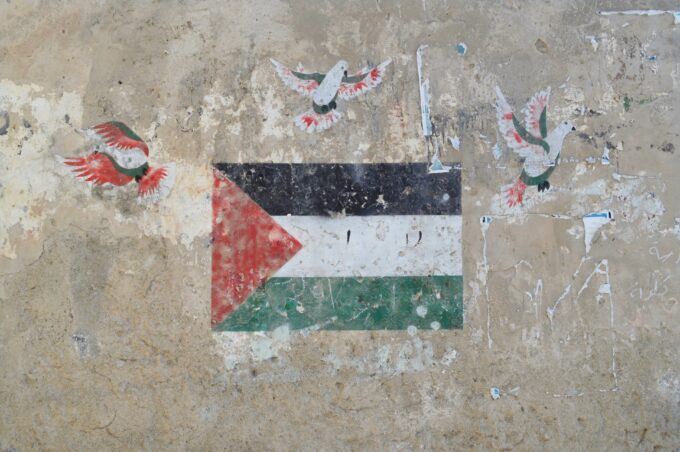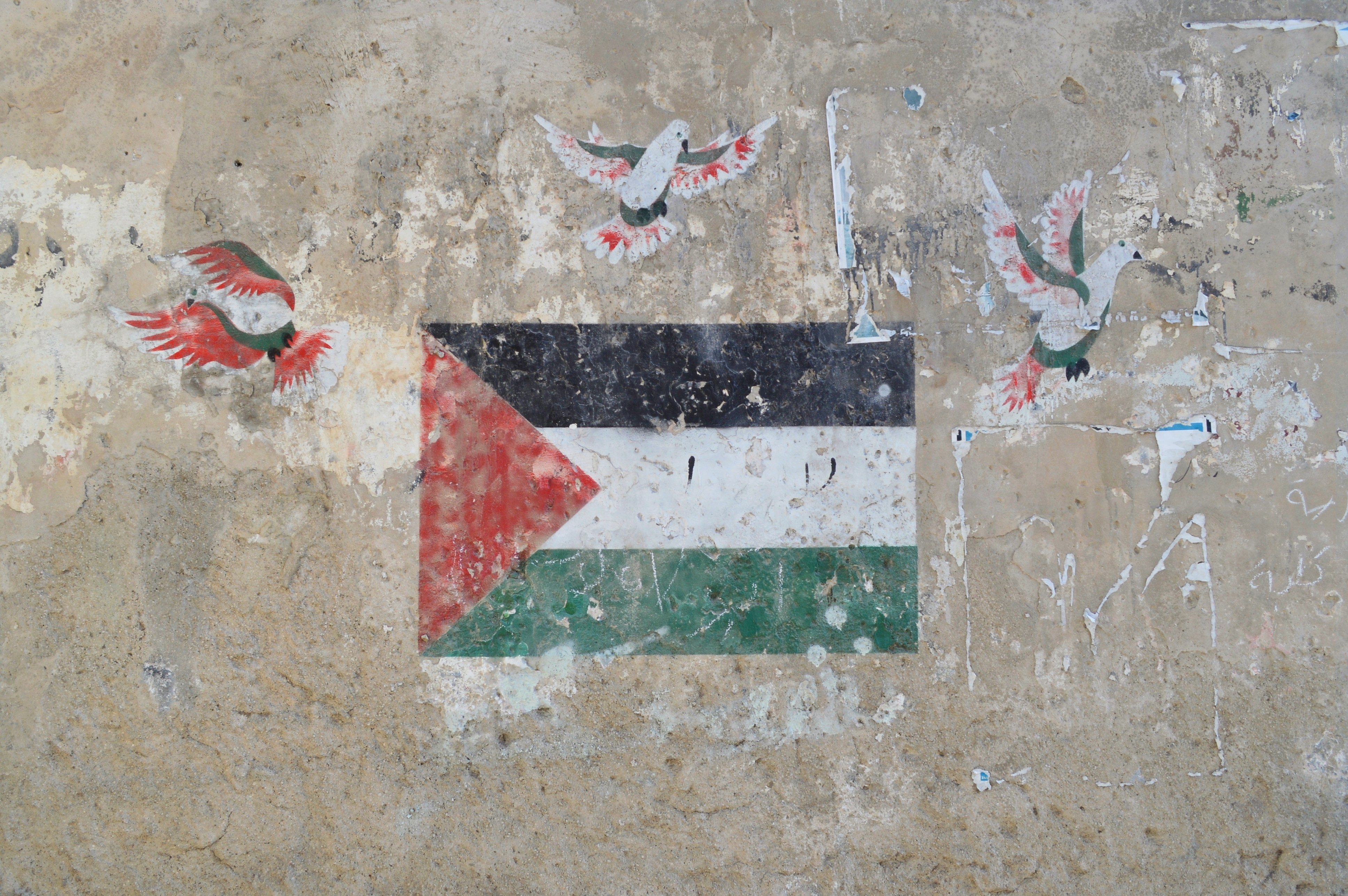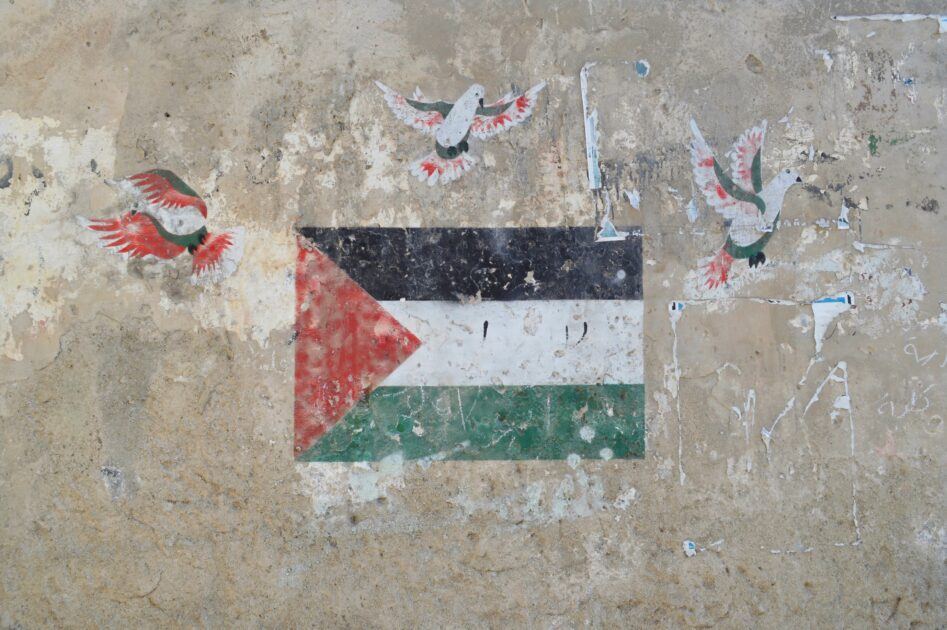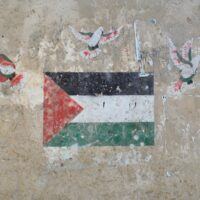


































































Image by Ash Hayes.
Reimagining Palestinian sovereignty through civilizational identity rather than rigid borders
For decades, the world has watched a tragic cycle repeat itself in Palestine and Israel: violence, Western-led “peace processes” that go nowhere, followed by more violence. We are told the conflict is a hopelessly complex clash between two nationalisms. But the problem is not complexity—it is power. Palestinians are struggling against a settler-colonial project determined to displace them. The real problem is the misguided framework we use to understand this so-called “conflict” and peace itself. This framework, conceptually rooted in rigid borders and committed to short-term negotiations, obscures the deeper question: how can a people continue to live, govern, and sustain their culture under imperialist occupation?
The Western nation-state model—a fortress with set borders and a single dominant national identity—is not just failing to solve this conflict; it is the engine that perpetuates it. To find a way forward, we must look beyond this model. One useful lens comes from the Global South: the Chinese concept of minzu jiefang or “national liberation.” In its original context during the Mao period, minzu jiefang “took as its focus the plight of minzu [nations] which had been conquered and were unjustly dominated by others, and implied that all minzu were deserving of sovereignty and dignity. Interestingly, the forces dominating those minzu who were struggling for liberation were not typically figured as ‘oppressor minzu’, but rather as a political force – imperialism. There should be, this concept implies, some measure of equality among minzu such that no minzu should be oppressed or exploited by these outside forces” (Thomas, pp. 133-134). Here, I use minzu jiefang as inspiration to imagine a stateless people whose shared culture, history, and ethics form the foundation of their nationhood and their right to national sovereignty, self-determination and dignity. The plight of Palestinians is the plight of a nation that has been conquered and is unjustly dominated by a Western imperialist outpost. Its struggle, including the suicide bombings in the Second Intifada and the October 7, 2023, attack, is a struggle for national liberation.
This Minzu jiefang-inspired framework encourages us to see nations not as static borders, but as living, evolving civilizations. It reminds us that belonging isn’t defined by having the correct paperwork or enclosing walls, but by participating in a shared project of history, ethics, and culture—a perspective that reframes what sovereignty can mean outside of statehood.
First, we must be clear as to why the standard Western state-based “solutions” that have been entertained for Israel and Palestine are non-starters and are doomed to fail by design. Engaging in any type of negotiations that promise a one-state or two-states as the reward at the end of successful negotiations is patently absurd. More accurately, it’s a diversion ensuring Israel’s control over the conquered Palestinian land and peoples in perpetuity—or as long as the so-called international community believes the farce that Israel is genuinely committed to peace and ending the conquest.
A one-state solution is unacceptable to Israel because, in a single state from the river to the sea, the Palestinians would outnumber Jews—approximately 7.6 million Palestinians vs. 7.2 million Jews—meaning the state would no longer be a “Jewish State” in its current ethno-state form enshrined in its constitution (2018).
A two-state solution is equally unpalatable because Israel covets the land of a potential Palestine. It seeks control over East Jerusalem which it sees as home to Judaism’s holiest sites: the Temple Mount, the Western Wall, and the ancient City of David. It views the West Bank, with sites like Hebron and Shiloh, as its biblical inheritance. And as Jared Kushner brazenly revealed – this should not have come as a surprise – the Gaza Strip is seen by some opportunistic imperialist actors as “very valuable” waterfront property to be cleared of Palestinian people and developed.
A biblical justification, of course, is a flimsy basis for modern political claims. Religious texts cannot substitute for political legitimacy and international law. The Bible, while a foundational spiritual text, is not a real estate deed. Even if its ancient histories could be verified, this would not erase the rights of the Palestinian people who have lived on and belonged to that land for centuries.
The Westphalian nation-state says, “You belong if you were born within these lines on the map or have the correct paperwork.” It is exclusive, rigid, and territorial. A minzu jiefang-inspired framework offers a different vision: a nation as a civilizational project, not a fixed administrative unit. Belonging is based on participation in shared culture, history, and ethics. Political organization becomes an ongoing project of civilizational continuity, rather than a static structure defended by borders. In this view, the land itself is inseparable from the people who shape and inhabit it, much as a river and its banks form a single living system.
We see echoes of this principle in global movements granting legal personhood to rivers—from New Zealand’s Whanganui River to Colombia’s Atrato River. These initiatives recognize that humans and the natural world are interconnected. Similarly, this framework recognizes that people and their land form an inseparable whole. Our legal and ethical systems have shown agility in protecting corporate interests (“corporate personhood”) and natural entities, yet they fail to recognize the inherent rights of a stateless people whose civilization predates modern states. A minzu jiefang-inspired framework contends that these rights should be the foundation of any just negotiation and solution.
Applied to Palestine, this framework changes everything. Palestinians are a sovereign civilizational entity from the start. Statehood becomes a step within a framework that respects their culture, history, and ethics, rather than a reward after prolonged negotiations. Current talks are mostly performative, revolve around tactical bargains—e.g., hostages for ceasefires, disarmament for aid—and historically the agreements emerging from them are breached before the news has a chance to reach global media audiences. A minzu jiefang-inspired approach elevates the discussion to civilizational rights, prioritizing Palestinian self-determination, cultural continuity, and political expression. Key agendas in this diagnostically superior approach and ensuing negotiations would include the Right of Return and the Right to Remain, ensuring the people can sustain and reconstitute their national life; Cultural Sovereignty, protecting heritage, memory, and social structures and institutions; and Legitimate Representation, creating a protected political process for Palestinians to unify, select negotiators, and shape solutions. By centering civilizational identity, negotiations would focus on the long-term survival and flourishing of Palestinian society.
The current model is not broken—it works as designed. It empowers recognized states and global imperialism while facilitating systemic injustice for conquered and dominated peoples. Under its auspices, Israel can claim it is fighting a “war of self-defense” against a non-state actor it illegally occupies, while asserting there is “no partner for peace” and actively undermining Palestinian political unity. Recognizing Palestinians’ civilizational rights to sovereignty and dignity and their armed resistance as a national liberation struggle removes this excuse. The partner for peace is the people themselves, and responsibility for peace falls squarely on the occupying power and its imperialist enablers who themselves are “enabled” by the Israel Lobby.
A minzu jiefang-inspired approach is agnostic about final political arrangements—one state, two states, or a confederation. Its goal is the restoration of Palestinian sovereignty, self-determination and dignity. By centering the people’s rights, it allows creative, just solutions to emerge organically.
The land is not a fortress to conquer. It is a river—a living, flowing civilization. Peace will not come from drawing borders on the map or externally imposed “solutions” aligned with imperialist interests, but from recognizing Palestinians as a people with inherent rights and a continuous civilizational identity. The most powerful mechanism for change is this paradigm shift itself. When journalists stop framing resistance as “terrorism” and correctly contextualize it as an anti-colonial struggle, when scholars and policymakers stop debating possible “borders” and start debating “responsibilities to a civilization,” the ground beneath the occupation will crumble. Our task is to make this framework inescapable—in classrooms, in newsrooms, and in diplomatic corridors—until the world can no longer see the 100-year-old conflict and the ongoing genocide through any other lens. Only by changing the framework can we hope to move toward peace and just solutions. Recognizing Palestinians as a living, flowing civilization is not a theoretical exercise—it is a moral and practical imperative, offering a path to justice that lines on the map and externally imposed solutions have repeatedly failed to provide, by design. We should not require more evidence to see that they are, and have always been, nothing more than a disingenuous exercise.
Thomas, Saul. 2022. “Minzu.” In Changing Theory: Concepts from the Global South, edited by Dilip M. Menon, 127-141. New York, NY: Routledge.
The post The Land is a River, Not a Fortress: A New Path to Peace in Palestine appeared first on CounterPunch.org.
This post was originally published on CounterPunch.org.